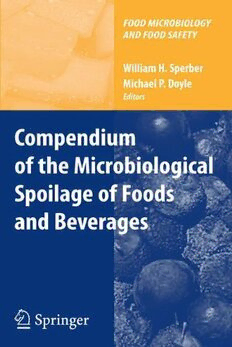
Compendium of the Microbiological Spoilage of Foods and Beverages PDF
380 Pages·2010·3.286 MB·English
Most books are stored in the elastic cloud where traffic is expensive. For this reason, we have a limit on daily download.
Preview Compendium of the Microbiological Spoilage of Foods and Beverages
Description:
The Compendium of the Microbiological Spoilage of Foods and Beverages is, to our knowledge, the first major publication devoted exclusively to this topic. Comprehensive coverage of microbiological spoilage has been provided by 28 contributors, most of whom have had long and successful careers in the food industry. Their comprehensive experience and knowledge of the microbiological spoilage of foods and beverages and its means of control and prevention have been collected and organized into 12 chapters that include all of the principal food and beverage categories.This Compendium will be a useful resource for many audiences. It will assist academic and food industry researchers in the development of products and manufacturing processes that will minimize or prevent product spoilage. It will assist quality assurance and engineering personnel in the operation of manufacturing plants so that spoilage is minimized. It is expected that the Compendium will be an important text book for advanced food microbiology classes. It is also likely that public health and non-governmental organizations that are working in developing countries will be able to use information from the Compendium to minimize food spoilage during transportation and storage of foodstuffs, thereby providing their target populations with increased food security.William H. SperberWith undergraduate majors in zoology and chemistry, William Sperber earned M.S. and Ph..D. degrees in microbiology at the University of Wisconsin. While working for more than forty years with three major food companies, Best Foods, Pillsbury, and Cargill, he became one of the world’s experts in designing and controlling the microbiological quality and safety of foods. Long active in professional and governmental organizations, he is the author of numerous presentations and publications. Now retired, he works part-time as Cargill’s Global Ambassador for Food Protection, where he originated the idea and continues to promote the formation of a new United Nations organization, the Food Protection Organization, to better protect the quality and safety of the global food supply.Michael P. DoyleWith B.S., M.S. and Ph.D. degrees in bacteriology/food microbiology earned at the University of Wisconsin-Madison, Michael Doyle is a Regents Professor of Food Microbiology and Director of the Center for Food Safety at the University of Georgia. He has served as a scientific advisor on food microbiology topics to many national and international organizations, including the World Health Organization, Food and Agriculture Organization of the United Nations, the International Life Sciences Institute-North America and many federal food agencies. He is an active researcher on interventions to control microbes in foods, with more than 350 scientific publications on microbiology topics.
See more
The list of books you might like
Most books are stored in the elastic cloud where traffic is expensive. For this reason, we have a limit on daily download.
